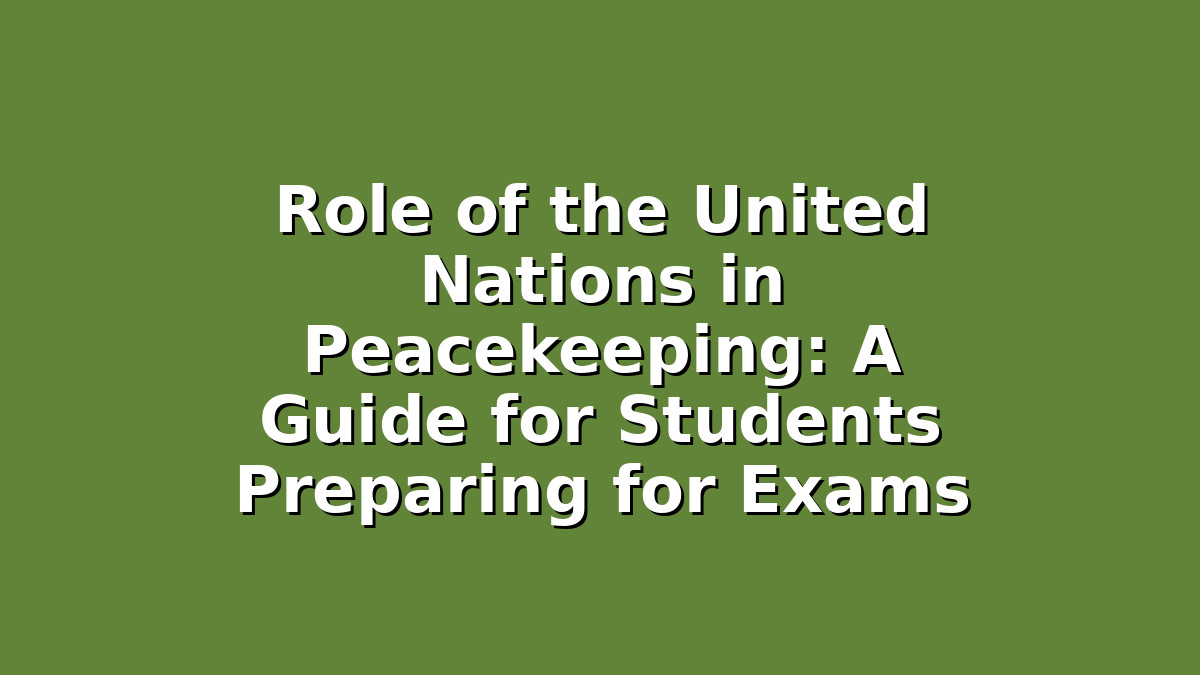When preparing for exams, especially in subjects like history, political science, or international relations, understanding global organizations such as the United Nations (UN) is essential. One of the UN’s most significant contributions to international stability is its peacekeeping role. This article will help you grasp the core concepts of UN peacekeeping, break down its importance, and provide effective study tips to remember key facts and concepts for your exams.
Introduction: Why Study the United Nations and Peacekeeping?
The United Nations was established in 1945 with a mission to maintain international peace and security, promote human rights, and foster social and economic development. Peacekeeping is one of the UN’s most visible and impactful activities. As a student, knowing how the UN functions in peacekeeping can enrich your understanding of conflict resolution and global cooperation.
In exam settings, questions on the UN often test your grasp of its structure, goals, and real-world actions. By mastering the role of the UN in peacekeeping, you’ll be well-prepared to tackle essay questions, multiple-choice quizzes, and debates. Let’s explore three important aspects of the UN’s peacekeeping and how you can study them effectively.
1. Understanding the Basics of UN Peacekeeping Missions
UN peacekeeping missions involve sending international personnel—soldiers, police officers, and civilian staff—to conflict zones to help maintain peace and security. These missions are usually authorized by the UN Security Council and aim to prevent the escalation of conflicts, protect civilians, support political processes, and help rebuild societies after conflict.
Key Points to Remember:
– The first UN peacekeeping mission was in 1948 in the Middle East (UNTSO).
– Peacekeepers are sometimes called “Blue Helmets” because of their distinctive blue headgear.
– Missions vary from observer missions (monitoring ceasefires) to multidimensional missions (including humanitarian aid and institution-building).
– The UN does not use peacekeepers to fight wars but to maintain peace and security.
Study Tip: Create flashcards with key mission names, dates, and objectives. For example, write “UNTSO – 1948 – Monitor ceasefire in Middle East” on one side and key details on the other. Regularly quiz yourself to reinforce memory.
2. The Role and Challenges Faced by UN Peacekeepers
The UN peacekeepers play a crucial role, but their work is not without challenges. Understanding these challenges will help you analyze the complexity of international peacekeeping and the limitations of the UN.
Roles of UN Peacekeepers:
– Monitoring ceasefires and peace agreements.
– Protecting civilians, especially vulnerable groups.
– Assisting in disarmament, demobilization, and reintegration of former combatants.
– Supporting elections and strengthening the rule of law.
– Facilitating humanitarian aid.
Challenges Faced:
– Limited resources and funding.
– Complex political situations with multiple conflicting parties.
– Lack of cooperation from local governments or warring factions.
– Risks to peacekeepers’ safety.
– Accusations of bias or failure to protect civilians in some cases.
Study Tip: Use real-world examples to deepen understanding. For instance, study the UN mission in Rwanda during the 1994 genocide and the lessons learned about peacekeeping limits. Writing practice essays on the successes and failures of specific missions can sharpen your analytical skills and exam answers.
3. Exam Preparation Strategies: Mastering Content and Critical Thinking
To excel in exams, memorizing facts is important, but developing critical thinking on the topic of UN peacekeeping will set you apart. Here are some strategies tailored for students:
a) Organize Your Notes Thematically
Group your study materials under themes such as “Objectives of UN peacekeeping,” “Major missions,” “Peacekeeping challenges,” and “Impact on global peace.” This helps in quick revision and clearer understanding.
b) Practice Past Exam Questions
Look for past exam papers or online quizzes related to international organizations or global peace. Practicing these questions will familiarize you with the type and style of questions commonly asked.
c) Use Mind Maps
Create mind maps linking the UN’s peacekeeping role to broader concepts like international law, sovereignty, and conflict resolution. Visual tools make it easier to recall information during exams.
d) Discuss and Teach Others
Studying in groups or explaining concepts to friends can reinforce your knowledge. Teaching others forces you to clarify your understanding and remember details better.
e) Stay Updated with Current Affairs
UN peacekeeping is an ongoing process, so knowing recent missions or controversies can provide real-life context. This is especially helpful for essay questions requiring you to apply knowledge to current scenarios.
Conclusion: Empowering Your Exam Success with UN Peacekeeping Knowledge
The United Nations’ role in peacekeeping is a critical topic that combines history, politics, and international relations. By understanding the basics of peacekeeping missions, the challenges peacekeepers face, and applying effective study strategies, you can confidently approach exam questions on this subject.
Remember, learning about the UN is not just about passing exams—it also helps you become a more informed global citizen. Use the study tips provided to create a strong foundation and keep your motivation high. With consistent effort and curiosity, you’ll master the topic and perform well in your exams.
Good luck with your studies!

Responses